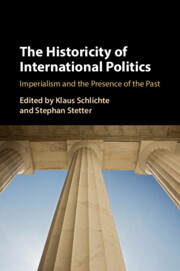Book contents
- The Historicity of International Politics
- The Historicity of International Politics
- Copyright page
- Contents
- Figures
- Contributors
- Acknowledgements
- Introduction
- Part I The Imperial Past and Present in International Politics and IR
- 2 The Colonial Origins – and Legacies – of International Organizations
- 3 Collective Hegemony after Decolonization
- 4 The Historicity of State Formation
- 5 Privateering, Colonialism and Empires
- 6 Where Did the Mongol Empire Go?
- 7 Where Would We Be without the Fog Lifting in Austerlitz?
- Part II Historical Sociology and the Imperial Fundaments of International Politics
- Part III Global History and the Imperial Fundaments of International Politics
- Conclusion
- Index
- References
3 - Collective Hegemony after Decolonization
Persistence despite Delegitimation
from Part I - The Imperial Past and Present in International Politics and IR
Published online by Cambridge University Press: 29 June 2023
- The Historicity of International Politics
- The Historicity of International Politics
- Copyright page
- Contents
- Figures
- Contributors
- Acknowledgements
- Introduction
- Part I The Imperial Past and Present in International Politics and IR
- 2 The Colonial Origins – and Legacies – of International Organizations
- 3 Collective Hegemony after Decolonization
- 4 The Historicity of State Formation
- 5 Privateering, Colonialism and Empires
- 6 Where Did the Mongol Empire Go?
- 7 Where Would We Be without the Fog Lifting in Austerlitz?
- Part II Historical Sociology and the Imperial Fundaments of International Politics
- Part III Global History and the Imperial Fundaments of International Politics
- Conclusion
- Index
- References
Summary
This chapter explores the effects of decolonization on the collective hegemony of the great powers in international society. The chapter contributes to research on the interplay of hierarchies by analysing the two modes of historicity that shaped this interplay: complex temporalities and the structuring effects of history. The first form of collective hegemony, the Concert of Europe, was established when parts of the world were already colonized, others in the process of decolonization and still others yet to be colonized. As the decolonized states were the chief opponents of collective hegemony, the successive decolonization of international society led to an increasing level of contestation. Collective hegemony, though, has persisted. The powerful states were able to perpetuate this practice both by benefiting from path-dependencies in formal governance institutions (UN Security Council) and by side-stepping the consent of smaller states through informal forms of collective hegemony (G7 and G20).
- Type
- Chapter
- Information
- The Historicity of International PoliticsImperialism and the Presence of the Past, pp. 66 - 83Publisher: Cambridge University PressPrint publication year: 2023
References
- 1
- Cited by

